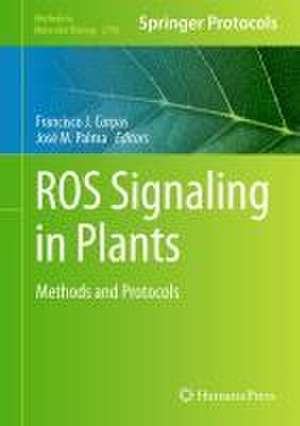ROS Signaling in Plants : Methods and Protocols : Methods in Molecular Biology, cartea 2798
Editat de Francisco J. Corpas, José M. Palmaen Limba Engleză Hardback – 9 apr 2024
Authoritative and practical, ROS Signaling in Plants: Methods and Protocols serves as an ideal guide for scientists interested in the metabolism of ROS in plant cells.
Din seria Methods in Molecular Biology
- 9%
 Preț: 791.59 lei
Preț: 791.59 lei - 23%
 Preț: 598.56 lei
Preț: 598.56 lei - 20%
 Preț: 882.95 lei
Preț: 882.95 lei -
 Preț: 252.04 lei
Preț: 252.04 lei - 5%
 Preț: 802.69 lei
Preț: 802.69 lei - 5%
 Preț: 729.61 lei
Preț: 729.61 lei - 5%
 Preț: 731.43 lei
Preț: 731.43 lei - 5%
 Preț: 741.30 lei
Preț: 741.30 lei - 5%
 Preț: 747.16 lei
Preț: 747.16 lei - 15%
 Preț: 663.45 lei
Preț: 663.45 lei - 18%
 Preț: 1025.34 lei
Preț: 1025.34 lei - 5%
 Preț: 734.57 lei
Preț: 734.57 lei - 18%
 Preț: 914.20 lei
Preț: 914.20 lei - 15%
 Preț: 664.61 lei
Preț: 664.61 lei - 15%
 Preț: 654.12 lei
Preț: 654.12 lei - 18%
 Preț: 1414.74 lei
Preț: 1414.74 lei - 5%
 Preț: 742.60 lei
Preț: 742.60 lei - 20%
 Preț: 821.63 lei
Preț: 821.63 lei - 18%
 Preț: 972.30 lei
Preț: 972.30 lei - 15%
 Preț: 660.49 lei
Preț: 660.49 lei - 5%
 Preț: 738.41 lei
Preț: 738.41 lei - 18%
 Preț: 984.92 lei
Preț: 984.92 lei - 5%
 Preț: 733.29 lei
Preț: 733.29 lei -
 Preț: 392.58 lei
Preț: 392.58 lei - 5%
 Preț: 746.26 lei
Preț: 746.26 lei - 18%
 Preț: 962.66 lei
Preț: 962.66 lei - 23%
 Preț: 860.21 lei
Preț: 860.21 lei - 15%
 Preț: 652.64 lei
Preț: 652.64 lei - 5%
 Preț: 1055.50 lei
Preț: 1055.50 lei - 23%
 Preț: 883.85 lei
Preț: 883.85 lei - 19%
 Preț: 491.88 lei
Preț: 491.88 lei - 5%
 Preț: 1038.84 lei
Preț: 1038.84 lei - 5%
 Preț: 524.15 lei
Preț: 524.15 lei - 18%
 Preț: 2122.34 lei
Preț: 2122.34 lei - 5%
 Preț: 1299.23 lei
Preț: 1299.23 lei - 5%
 Preț: 1339.10 lei
Preț: 1339.10 lei - 18%
 Preț: 1390.26 lei
Preț: 1390.26 lei - 18%
 Preț: 1395.63 lei
Preț: 1395.63 lei - 18%
 Preț: 1129.65 lei
Preț: 1129.65 lei - 18%
 Preț: 1408.26 lei
Preț: 1408.26 lei - 18%
 Preț: 1124.92 lei
Preț: 1124.92 lei - 18%
 Preț: 966.27 lei
Preț: 966.27 lei - 5%
 Preț: 1299.99 lei
Preț: 1299.99 lei - 5%
 Preț: 1108.51 lei
Preț: 1108.51 lei - 5%
 Preț: 983.72 lei
Preț: 983.72 lei - 5%
 Preț: 728.16 lei
Preț: 728.16 lei - 18%
 Preț: 1118.62 lei
Preț: 1118.62 lei - 18%
 Preț: 955.25 lei
Preț: 955.25 lei - 5%
 Preț: 1035.60 lei
Preț: 1035.60 lei - 18%
 Preț: 1400.35 lei
Preț: 1400.35 lei
Preț: 1226.73 lei
Preț vechi: 1496.01 lei
-18% Nou
Puncte Express: 1840
Preț estimativ în valută:
234.77€ • 242.52$ • 195.38£
234.77€ • 242.52$ • 195.38£
Carte tipărită la comandă
Livrare economică 25 martie-08 aprilie
Preluare comenzi: 021 569.72.76
Specificații
ISBN-13: 9781071638255
ISBN-10: 1071638254
Ilustrații: XI, 266 p. 64 illus., 46 illus. in color.
Dimensiuni: 178 x 254 mm
Greutate: 0.7 kg
Ediția:2024
Editura: Springer Us
Colecția Humana
Seria Methods in Molecular Biology
Locul publicării:New York, NY, United States
ISBN-10: 1071638254
Ilustrații: XI, 266 p. 64 illus., 46 illus. in color.
Dimensiuni: 178 x 254 mm
Greutate: 0.7 kg
Ediția:2024
Editura: Springer Us
Colecția Humana
Seria Methods in Molecular Biology
Locul publicării:New York, NY, United States
Cuprins
Electrochemical Detection of Total Antioxidant Capacity (TAC) in Plant Tissues from Different Origins.- Singlet Oxygen and Superoxide Anion Radical Detection by EPR Spin Trapping in Thylakoid Preparations.- Singlet Oxygen Detection by Chemiluminescence Probes in Living Cells.- Non-Invasive In Planta Live Measurements of H2O2 and Glutathione Redox Potential with Fluorescent roGFPs-Based Sensors.- Determination of ROS Generated by Arabidopsis XANTHINE DEHYDROGENASE1 (AtXDH1) Using Nitroblue Tetrazolium (NBT) and 3,3′-Diaminobenzidine (DAP).- Malondialdehyde Assays in Higher Plants.- Roles of Reactive Carbonyl Species (RCS) in Plant Response to Abiotic Stress.- Measurements of Ascorbate and Dehydroascorbate in Plants Using High-Performance Liquid Chromatography.- Carotenoids and Tocopherol Profiling in Fleshy Fruits.- Anthocyanins: Quantification by Tandem Mass Spectrometry.- Common Methods of Extraction and Determination of Phytomelatonin in Plants.- Determination of Free Proline in Plants.- An Enzyme Assay Kit for GABA Quantification in Plant Tissues.- Identification of Superoxide Dismutase (SOD) Isozymes in Plant Tissues.- Comparative Analysis of Catalase Activity in Plants: Spectrophotometry and Native PAGE Approaches.- Detection of Ascorbate Peroxidase (APX) Activity in Plant Tissues: Using Non-Denaturing PAGE and Spectrophotometric Assay.- Inactivation of Three Stacked Genes of Cytosolic Peroxiredoxins by Genome Editing.
Textul de pe ultima copertă
This detailed volume presents methodologies for studying reactive oxygen species (ROS) metabolism in plant cells, including techniques for detecting different types of ROS such as superoxide radicals, hydrogen peroxide or singlet oxygen, as well as ROS generating systems such as xanthine oxidoreductase. The book provides alternatives to determine malondialdehyde, electrochemical detection approaches for determining total antioxidant capacity (TAC) as well as enzymatic antioxidants, as well as methods for studying non-enzymatic antioxidants and some components of the secondary metabolism. Written for the highly successful Methods in Molecular Biology series, the chapters in this book provide the kind of detailed implementation advice that leads to ideal results in the laboratory.
Authoritative and practical, ROS Signaling in Plants: Methods and Protocols serves as an ideal guide for scientists interested in the metabolism of ROS in plant cells.
Caracteristici
Includes cutting-edge techniques Provides step-by-step detail essential for reproducible results Contains key implementation advice from the experts
